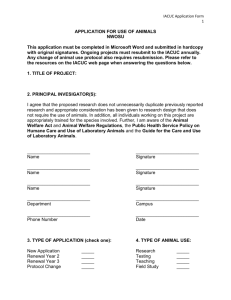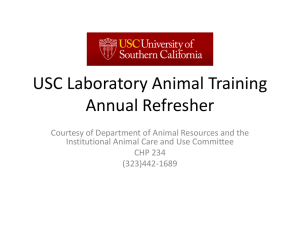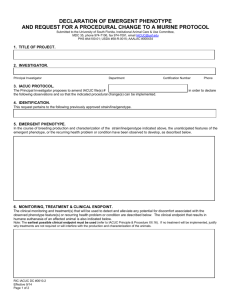IACUC Protocol Review Process
advertisement
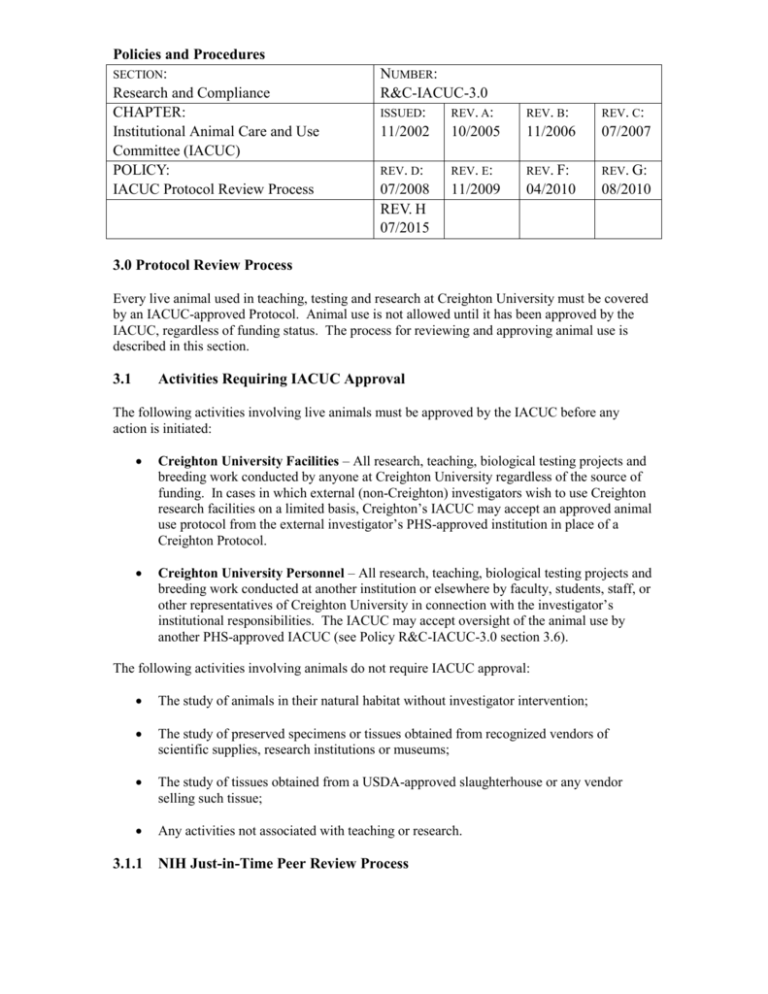
Policies and Procedures SECTION: Research and Compliance CHAPTER: Institutional Animal Care and Use Committee (IACUC) POLICY: IACUC Protocol Review Process NUMBER: R&C-IACUC-3.0 ISSUED: REV. A: 11/2002 10/2005 REV. B: REV. C: 11/2006 07/2007 REV. D: REV. E: REV. F: REV. G: 07/2008 REV. H 07/2015 11/2009 04/2010 08/2010 3.0 Protocol Review Process Every live animal used in teaching, testing and research at Creighton University must be covered by an IACUC-approved Protocol. Animal use is not allowed until it has been approved by the IACUC, regardless of funding status. The process for reviewing and approving animal use is described in this section. 3.1 Activities Requiring IACUC Approval The following activities involving live animals must be approved by the IACUC before any action is initiated: Creighton University Facilities – All research, teaching, biological testing projects and breeding work conducted by anyone at Creighton University regardless of the source of funding. In cases in which external (non-Creighton) investigators wish to use Creighton research facilities on a limited basis, Creighton’s IACUC may accept an approved animal use protocol from the external investigator’s PHS-approved institution in place of a Creighton Protocol. Creighton University Personnel – All research, teaching, biological testing projects and breeding work conducted at another institution or elsewhere by faculty, students, staff, or other representatives of Creighton University in connection with the investigator’s institutional responsibilities. The IACUC may accept oversight of the animal use by another PHS-approved IACUC (see Policy R&C-IACUC-3.0 section 3.6). The following activities involving animals do not require IACUC approval: The study of animals in their natural habitat without investigator intervention; The study of preserved specimens or tissues obtained from recognized vendors of scientific supplies, research institutions or museums; The study of tissues obtained from a USDA-approved slaughterhouse or any vendor selling such tissue; Any activities not associated with teaching or research. 3.1.1 NIH Just-in-Time Peer Review Process Policies and Procedures SECTION: Research and Compliance CHAPTER: Institutional Animal Care and Use Committee (IACUC) POLICY: IACUC Protocol Review Process NUMBER: R&C-IACUC-3.0 ISSUED: REV. A: 11/2002 10/2005 REV. B: REV. C: 11/2006 07/2007 REV. D: REV. E: REV. F: REV. G: 07/2008 REV. H 07/2015 11/2009 04/2010 08/2010 Protocols that have been approved under the NIH Just-in-Time Peer Review Process must still be submitted to the IACUC for review and approval. The Principal Investigator is advised that the IACUC may require changes or additions to the Protocol despite “study section approval” under the NIH Just-in-Time Peer Review Process. 3.2 Types of Review The IACUC uses two mechanisms for reviewing Applications and Protocols. These are Full Committee Review and Designated Member Review. 3.2.1 Full Committee Review (FCR) Full Committee Reviews are conducted by a quorum of members at an IACUC meeting. Any action by the committee following review (see Policy R&C-IACUC-3.0 section 3.5) requires a majority vote by those members present. In addition, items that were assigned to Designated Member Review will be reviewed by Full Committee Review if the item is not approved by all Designated Reviewers or if any Designated Reviewer has requested Full Committee Review. Review by Full Committee Review requires that materials be submitted no later than 5:00 p.m. of the first Monday of the month if they are to be reviewed at the IACUC meeting scheduled for later that month. If the first Monday falls on a Creighton University holiday, the deadline is the first working day that follows. Materials submitted after the first Monday of the month will be reviewed at the IACUC meeting during the following month, unless an Expedited Review is granted. Full Committee Reviews are used in the following capacities: Initial Application Review – All Applications are subject to Full Committee Review on initial submission (see Policy R&C-IACUC-3.0 section 3.5.1). Tabled Application Review – Applications designated “Tabled” after initial review are subject to Full Committee Review on resubmission (see Policy R&C-IACUC-3.0 section 3.5.1). Review of Significant Modification to an Approved Protocol – Modifications or amendments to approved Protocols that are classified as Significant will be reviewed by the full IACUC if requested by the Principal Investigator or an IACUC member (see Policy R&C-IACUC-3.0 section 3.5.2). If a Full Committee Review is requested, then the request will normally be reviewed at the IACUC meeting following the next regular Protocol submission deadline. Policies and Procedures SECTION: Research and Compliance CHAPTER: Institutional Animal Care and Use Committee (IACUC) POLICY: IACUC Protocol Review Process NUMBER: R&C-IACUC-3.0 ISSUED: REV. A: 11/2002 10/2005 REV. B: REV. C: 11/2006 07/2007 REV. D: REV. E: REV. F: REV. G: 07/2008 REV. H 07/2015 11/2009 04/2010 08/2010 Continuing Review of Open Protocol – All open Protocols must be reviewed on an annual basis, initially by full committee (see Policy R&C-IACUC-3.0 section 3.5.3). Renewal Review – Requests for Protocol renewal are reviewed as a new Protocol Application (see Policy R&C-IACUC-3.0 section 3.5.4). Expedited Review – Requests for Expedited Review are considered when extraordinary circumstances require that any of the above review activities occur sooner than would occur under the normal review process (see Policy R&C-IACUC-3.0 section 3.5.5). 3.2.2 Designated Member Review (DMR) Some review activities of the IACUC may be carried out by one or more Designated Reviewer(s) (DR) without a formal meeting of the full IACUC. A description of any item proposed for Designated Member Review will be provided to each IACUC member prior to the review. Full text versions of the item will be provided to any IACUC member on request. Any IACUC member may request Full Committee Review or participation in the Designated Member Review process as a Designated Reviewer by informing the Chair within three working days of notification. If there is no request for Full Committee Review, the Chair will designate one or more qualified members to review the item. The Designated Reviewer(s) will include all members requesting participation in the Designated Member Review process. Designated Member Reviews may take place at any time, and are used in the following capacities: Revised Application Review – After initial review by Full Committee Review of a new or renewal Application, the IACUC may assign Designated Reviewer(s) to review revisions after the committee votes to categorize an Application as “Revision Required to Secure Approval” (see Policy R&C-IACUC-3.0 section 3.5.1). Review of Significant Modification to an Approved Protocol – Requests for changes in approved Protocols that are defined as Significant Modifications according to Policy R&CIACUC-3.0 section 3.5.2 will be distributed to the IACUC members. IACUC members will have three working days from the date of notification the request has been posted to review the modifications. Any IACUC member who wants to request Full Committee Review (see Policy R&C-IACUC-3.0 section 3.2.1) or to be a Designated Reviewer must inform the Chair within this time period. If there is no request for Full Committee Review, the Chair will designate one or more Designated Reviewer(s). Minor (i.e., non-significant) modifications to open Protocols can be approved by the Chair or his/her designee without notification of the full committee (see Policies and Procedures SECTION: Research and Compliance CHAPTER: Institutional Animal Care and Use Committee (IACUC) POLICY: IACUC Protocol Review Process NUMBER: R&C-IACUC-3.0 ISSUED: REV. A: 11/2002 10/2005 REV. B: REV. C: 11/2006 07/2007 REV. D: REV. E: REV. F: REV. G: 07/2008 REV. H 07/2015 11/2009 04/2010 08/2010 Policy R&C-IACUC-3.0 section 3.5.2). Continuing Review of Open Protocol – After continuing annual review of an open Protocol, one or more Designated Reviewers may be assigned to review revisions to Continuing Reviews for which the committee has requested Additional Information Required to Secure Approval (see Policy R&C-IACUC-3.0 section 3.5.3). Designated Reviewers have authority to approve, require revision to secure approval, or request Full Committee Review for an item. The Designated Reviewer(s) may consult with additional individuals as part of the review process. A unanimous decision is required of all the Designated Reviewers before approval will be granted. If there are any questions or requests for revision, then a Primary Designated Reviewer communicates the concerns to the investigator. Revised applications are posted for all reviewers as above and all reviewers’ comments collected until there is unanimous approval by all Designated Reviewers or there is a request for Full Committee Review. If the Principal Investigator cannot revise the Application to the satisfaction of all the Designated Reviewer(s), it defaults to Full Committee Review and is considered at the next scheduled committee meeting. The Chair will notify the Principal Investigator in writing of the reasons for the decision. The Principal Investigator may respond with further clarification or revision. Designated Reviewers other than the Chair must notify the Chair of their review decisions in writing (e-mail and/or hard copy). 3.3 Categories of Animal Use IACUC categorizes animal use based on the purpose of the animal use and the extent of pain, discomfort or distress anticipated for the animals. Additional information on these four categories can be found in the Application Instructions. The categories parallel USDA designations: Category B – Breeding that involves no procedures or functional deficits that may cause more than momentary or slight pain, discomfort or distress. Category C – Research or teaching that involves no procedures or functional deficits that may cause more than momentary or slight pain, discomfort or distress. Category D – Research, teaching or breeding that has the potential to cause more than momentary slight pain, discomfort or distress that will be alleviated with appropriate anesthesia, analgesia or tranquilizers; and/or that involves chronic maintenance of animals with a minor to moderate functional deficit. Policies and Procedures SECTION: Research and Compliance CHAPTER: Institutional Animal Care and Use Committee (IACUC) POLICY: IACUC Protocol Review Process 3.4 NUMBER: R&C-IACUC-3.0 ISSUED: REV. A: 11/2002 10/2005 REV. B: REV. C: 11/2006 07/2007 REV. D: REV. E: REV. F: REV. G: 07/2008 REV. H 07/2015 11/2009 04/2010 08/2010 Category E – Research, teaching or breeding involving more than momentary pain, discomfort or distress that cannot or will not be alleviated through the administration of appropriate anesthetics, analgesics, or tranquilizers; and/or that involves chronic maintenance of animals with a severe functional deficit. Review Criteria Federal requirements state that the IACUC review proposals for animal use must be based on the following criteria: Potential Value of the Study – Activities involving live animals are designed and performed with the reasonable expectation that such use of animals will contribute to the enhancement of human or animal health, the advancement of knowledge or the good of society (PHS Policy). Selection of Animal Species – The animals selected are of an appropriate species and the number of animals requested is the minimum number needed to obtain valid results (PHS Policy). Minimization of Pain and Distress: Procedures with animals will avoid or minimize discomfort, distress and pain to the animals, consistent with sound research design [9 CFR 2.31(d) (1) (i) and PHS Policy, Section IV.C.1.a]. Procedures that may cause more than momentary or slight pain or distress to the animals will be performed with appropriate sedation, analgesia or anesthesia, unless the Principal Investigator justifies, in writing, the scientific reasons that the procedure must be performed without such treatments [9 CFR 2.31(d) (1) (iv) (A) and PHS Policy, Section IV.C.1.b]. The Principal Investigator has consulted with the Attending Veterinarian or his/her designee in planning procedures that may cause more than momentary or slight pain or distress to the animals [9 CFR 2.31(d) (1) (iv) (B)]. Procedures that cause more than momentary or slight pain and/or distress to the animals will not include the use of paralytics without anesthesia [9 CFR 2.31(d) (1) (iv) (C)]. Policies and Procedures SECTION: Research and Compliance CHAPTER: Institutional Animal Care and Use Committee (IACUC) POLICY: IACUC Protocol Review Process NUMBER: R&C-IACUC-3.0 ISSUED: REV. A: 11/2002 10/2005 REV. B: REV. C: 11/2006 07/2007 REV. D: REV. E: REV. F: REV. G: 07/2008 REV. H 07/2015 11/2009 04/2010 08/2010 Animals that would otherwise experience severe or chronic pain or distress that cannot be relieved will be humanely euthanized at the end of the procedure, or if appropriate, during the procedure [9 CFR 2.31(d) (1) (v) and PHS Policy, Section IV.C.1.c]. Alternatives – The Principal Investigator has considered alternatives to procedures that may cause more than momentary or slight pain and has provided a written narrative description of the methods and sources used to determine that alternatives are not available [9 CFR 2.31(d ) (1) (ii)]. Duplication – The Principal Investigator has provided written assurance that proposed activities involving animals does not unnecessarily duplicate previous experiments [9 CFR 2.31(d) (1) (iii)]. Living Conditions and Housing – Animal living conditions and housing are appropriate for the species and contribute to the health and comfort of the animals [9 CFR 2.31(d) (1) (vi) and PHS Policy, Section IV.C.1.d]. Personnel – Personnel conducting procedures will be appropriately qualified and trained in those procedures [9 CFR 2.31(d) (1) (viii) and PHS Policy, Section IV.C.1.f]. Surgery: Activities that involve surgery include appropriate provision for pre- and postoperative care of the animals in accordance with established veterinary medical and nursing practices [9 CFR 2.31(d ) (1) (ix)]. No animal will be used in more than one major operative procedure from which it is allowed to recover unless it is: o Justified for scientific reasons in writing by the Principal Investigator, or o Required as routine veterinary procedure or to protect the health or well-being of the animal as determined by the Attending Veterinarian [9 CFR 2.31(d) (1) (x)]. Euthanasia – Methods of euthanasia must be consistent with the most recent Report of the American Veterinary Medical Association Guidelines on Euthanasia, unless a deviation is justified for scientific reasons in writing by the Principal Investigator [9 CFR 2.31(d) (1) (xi) and PHS Policy, Section IV.C.1.g]. Policies and Procedures SECTION: Research and Compliance CHAPTER: Institutional Animal Care and Use Committee (IACUC) POLICY: IACUC Protocol Review Process 3.5 NUMBER: R&C-IACUC-3.0 ISSUED: REV. A: 11/2002 10/2005 REV. B: REV. C: 11/2006 07/2007 REV. D: REV. E: REV. F: REV. G: 07/2008 REV. H 07/2015 11/2009 04/2010 08/2010 Review Process Two primary forms are used by IACUC for reviewing animal use: Animal Use Protocol Application (the Application) – The Application must be used for new projects, significant revisions to existing Protocols, and Protocol renewals. Animal Protocol Continuing Review Form (Continuing Review form) – The Continuing Review form must be used to submit information for continuing IACUC review of previously approved projects, which occurs at least annually for each approved Protocol. The Application and Instructions along with the Continuing Review form are available on the IACUC website at http://www.creighton.edu/researchcompliance/iacuc/forms/. 3.5.1 New Protocol Application Submitting the Application – An Application must be completed for any new project involving animal use. An electronic version must be submitted to the IACUC Office no later than 5:00 p.m. of the first Monday of the month in which IACUC review is requested. If the first Monday falls on a University holiday, the deadline is the first working day that follows. All correspondence regarding the Application should include the Protocol title. Requirements for Application Review – All applicable sections of the Application must be completed in full as described in the Instructions, (see Policy R&C-IACUC-.1.0 for qualifications of the Principal Investigator). All personnel listed on the Application must have IACUC Certification (see Policy R&C-IACUC-2.0 section 2.2). Processing the Application – Upon receipt of the Application by the IACUC Office: The Application is given an IACUC number. The proposal is placed on the agenda for consideration at the next IACUC meeting The IACUC Chair and/or designee assigns a Primary and Secondary Advocate The Application is made available to all members of the IACUC, either electronically or on paper, at least one week prior to the meeting at which the Application will be reviewed. Policies and Procedures SECTION: Research and Compliance CHAPTER: Institutional Animal Care and Use Committee (IACUC) POLICY: IACUC Protocol Review Process NUMBER: R&C-IACUC-3.0 ISSUED: REV. A: 11/2002 10/2005 REV. B: REV. C: 11/2006 07/2007 REV. D: REV. E: REV. F: REV. G: 07/2008 REV. H 07/2015 11/2009 04/2010 08/2010 The Chair or his/her designee, in consultation with the other IACUC members, may provide the Principal Investigator with a list of initial concerns or questions about the Application prior to the IACUC meeting. The Principal Investigator may then, if desired, make changes in the Application prior to the meeting to improve the likelihood of approval. If such a revised Application is submitted, it is made available to all members of the IACUC, either electronically or on paper, prior to the meeting; The Principal Investigator may be asked to discuss the Application at the meeting at which the Application will be considered. Principal Investigators may also request to speak at the meeting. Reviewing the Application – Applications are considered for approval during regularly scheduled meetings of the full IACUC, unless Urgent Review is requested and granted (see Policy R&C IACUC 3.0 section 3.5.5). If Urgent Review is granted, the Application will be considered during a meeting called specifically for that purpose. No member may participate in the IACUC review or approval of a research project in which the member has a conflicting interest except to provide information requested by the IACUC; nor may a member who has a conflicting interest contribute to the constitution of a quorum. In all cases, a quorum of the IACUC must be present when initially reviewing any Application. During the meeting, the IACUC members decide the action to be taken on the Application. Reviewed Applications will be assigned to one of the following five categories, based on a majority vote of the IACUC members present: Approved – The Application is approved as presented with no revisions required. The PI will be asked to sign a copy of the Application, and the Chair and Attending Veterinarian will sign the Application. The Chair will provide the Principal Investigator with a signed IACUC approval letter. For activities funded by an external agency, the Principal Investigator bears the responsibility of forwarding the IACUC approval information to the agency. Revision Required to Secure Approval –The Application is not approved because revisions are required to make the Protocol acceptable to the IACUC. If no member requests Full Committee Review of the revised Application, the Chair designates one or more members to review the revision (see Policy R&C-IACUC-3.0 section 3.2.2). The Chair or a Designated Reviewer will notify the Principal Investigator in writing of the required revisions. After a revised version of the Application and an accompanying memo describing the revisions have been received by the IACUC, they are reviewed by the Designated Reviewer(s) unless Full Committee Review has been requested. The Designated Reviewers post comments on the revised version for all reviewers to read. The Designated Reviewer(s) has the authority to approve, require further revisions of, or Policies and Procedures SECTION: Research and Compliance CHAPTER: Institutional Animal Care and Use Committee (IACUC) POLICY: IACUC Protocol Review Process NUMBER: R&C-IACUC-3.0 ISSUED: REV. A: 11/2002 10/2005 REV. B: REV. C: 11/2006 07/2007 REV. D: REV. E: REV. F: REV. G: 07/2008 REV. H 07/2015 11/2009 04/2010 08/2010 request Full Committee Review of the revised application. If the revised Application is approved by all Designated Reviewers, the Principal Investigator will be asked to sign a copy of the Application, the Chair and the Attending Veterinarian will sign the Application, and the Chair will provide the Principal Investigator with a signed IACUC approval letter. A unanimous decision is required of all the Designated Reviewers before approval will be granted. If there are any questions or requests for revision, then a Primary Designated Reviewer communicates the concerns to the investigator. Revised applications are posted for all reviewers as above and all reviewers’ comments collected until there is unanimous approval by all Designated Reviewers or there is a request for Full Committee Review. If the Principal Investigator cannot revise the Application to the satisfaction of all the Designated Reviewer(s), it defaults to Full Committee Review and is considered at the next scheduled committee meeting. The Chair will notify the Principal Investigator in writing of the reasons for the decision. The Principal Investigator may respond with further clarification or revision. Tabled – The IACUC requires substantial additional information and/or has significant concerns about the Application, such that Full Committee Review of a revised Application is required. The Chair or his/her designee will notify the Principal Investigator in writing of the decision and will arrange to discuss the Application with the investigator. Before the IACUC review can continue, the Principal Investigator must revise and resubmit the Application (signed original and electronic version), clearly identifying changes. In addition, the Principal Investigator must provide a separate cover letter to the IACUC specifically responding to each item listed in the notice of the decision to table the Application. Review of the revised Application may result in any of the outcomes described in this section. Disapproved – The Application is not approved and the IACUC will not review a modified version of the Application. The Chair will notify the Principal Investigator in writing if the Application is disapproved, providing the basis for the IACUC decision. If an Application is disapproved, the Principal Investigator has the if an Application is disapproved, the Principal Investigator is given the opportunity to respond in person or in writing regarding the decisions made by the IACUC.. The IACUC may, at its discretion, obtain external review of the Application by a PHS-approved IACUC of an equivalent institution and/or by expert consultants in the field of that research. The Creighton University IACUC, however, shall be the final authority in determining the acceptability of the Application. Decline to Review – Where the Application has significant deficiencies in information, or where the Principal Investigator has failed to follow the Instructions for completing the Application, or in other similar situations, the IACUC will return the Application to the Policies and Procedures SECTION: Research and Compliance CHAPTER: Institutional Animal Care and Use Committee (IACUC) POLICY: IACUC Protocol Review Process NUMBER: R&C-IACUC-3.0 ISSUED: REV. A: 11/2002 10/2005 REV. B: REV. C: 11/2006 07/2007 REV. D: REV. E: REV. F: REV. G: 07/2008 REV. H 07/2015 11/2009 04/2010 08/2010 Principal Investigator with an indication of why the Application was not reviewed. In those situations, the Principal Investigator is encouraged to discuss the Application with the IACUC Chair or his/her designee to receive assistance in correcting the deficiencies. The completed Application (signed original and electronic version) should be resubmitted by 5:00 p.m. of the first Monday of the month for IACUC review. Applications classified as Revision Required or Tabled must be revised within six months of receipt of the letter of notification, or the Application will be considered withdrawn. Protocols are valid from the date of Approval for a maximum of three years and are subject to Continuing Review on at least an annual basis. 3.5.2 Modifications to an Approved Protocol Approved Protocols grant permission to conduct only those activities listed in the Protocol, conducted in the manner described, by the individuals listed, with no more than the number of animals indicated in the Protocol. Any changes in procedures, personnel, endpoints, care or use of additional animals require IACUC approval before the changes are implemented. The IACUC recognizes two general classes of modification to open Protocols: Significant modifications – Significant modifications are those that require careful review by one or more IACUC members to determine whether potential changes will affect animal welfare, and if so whether the changes are appropriately justified. These modifications include (but are not limited to): Changes in the objectives of a study Changes in surgical procedures, including a switch from non-survival to survival surgery Changes in the degree of invasiveness of a procedure or discomfort to an animal Changes in the duration, frequency or number of procedures performed on an animal Changes in anesthetic agent(s) Changes in the use or withholding of analgesics Policies and Procedures SECTION: Research and Compliance CHAPTER: Institutional Animal Care and Use Committee (IACUC) POLICY: IACUC Protocol Review Process NUMBER: R&C-IACUC-3.0 ISSUED: REV. A: 11/2002 10/2005 REV. B: REV. C: 11/2006 07/2007 REV. D: REV. E: REV. F: REV. G: 07/2008 REV. H 07/2015 11/2009 04/2010 08/2010 Changes in methods of euthanasia Changes in species, or in the number of animals used by more than 10 percent Changes in key personnel Minor modifications – Minor modifications are those that involve only small changes in animal numbers or procedures and thus have limited potential to affect animal welfare, or those that are administrative in nature. These modifications include but are not limited to: Changes in animal use location Changes in mailing addresses, phone numbers, and email addresses Changes in or addition of funding sources Increases in animal numbers by no more than 10 percent Addition of another strain of the same animal species (if total numbers change by no more than 10 percent) Changes in the sex of animals to be used Changes in the timing of sampling procedures The Principal Investigator is encouraged to consult with the IACUC Office or Chair for assistance in determining the category into which a proposed modification falls. Proposed modifications should be prepared by making changes to all relevant sections of the last approved version of the Protocol, and then providing a brief summary of these changes and the reason for them on the Protocol’s cover page. Requested modifications should be reflected wherever appropriate in the Protocol. (For example, adding a new procedure may require changes to the duties of project staff, the category of Pain and Distress, objectives, experimental design, number of animals, etc., as well as the addition of the new procedure itself.) The modified Protocol should be submitted electronically, preferably in Microsoft Word format as this facilitates identification of changes made in the modification request. The IACUC Chair or his/her designee will determine the class of the modification requested. Significant modifications enter the Designated Member Review process, with at least one Policies and Procedures SECTION: Research and Compliance CHAPTER: Institutional Animal Care and Use Committee (IACUC) POLICY: IACUC Protocol Review Process NUMBER: R&C-IACUC-3.0 ISSUED: REV. A: 11/2002 10/2005 REV. B: REV. C: 11/2006 07/2007 REV. D: REV. E: REV. F: REV. G: 07/2008 REV. H 07/2015 11/2009 04/2010 08/2010 Designated Reviewer being assigned by the Chair if no IACUC member requests to be a reviewer or request full committee review. In cases in which extensive modifications are requested by the Principal Investigator, the Chair or another IACUC member may request Full Committee Review– in this case, the request should be submitted before the next regular Application submission deadline to ensure review at that month’s IACUC meeting. Minor modifications do not undergo Designated Member Review, but are reviewed by the Chair or his/her designee without notification of all IACUC members. A request for Protocol modification may result in: Approval – The modified Protocol is approved as submitted and replaces the previous version of the Protocol on the date of approval. In the case of Designated Member Review, approval must be given by all individuals acting as Designated Reviewers. If approved, the PI will be asked to sign a copy of the Application, the Chair will sign the Application, and the Chair will provide the Principal Investigator with a signed IACUC approval letter. Approval of a modification does not alter the expiration date of a Protocol. Revision Required to Secure Approval - The requested modification is not approved because revisions are required to make the modified Protocol acceptable to the IACUC. The Chair or a Designated Reviewer will notify the Principal Investigator of the required revisions. After a revised version of the modified Protocol has been received by the IACUC, the revision is reviewed by the same members who conducted the previous review. Disapproved – The requested modification is not approved and will not be reconsidered by the IACUC. The Chair informs the investigators by written notification of the reasons for its decision and the investigator is given an opportunity to respond in person or in writing regarding the decisions made by the IACUC. No animals may be procured or used for experimentation without an approved protocol on file with the IACUC. 3.5.3 Continuing Review All animal protocols must be re-approved by the IACUC annually if the protocol is to remain open. The purpose of this Continuing Review is to provide the IACUC with current information concerning the status of Protocols. The IACUC therefore conducts Continuing Review of each Protocol during the last regularly scheduled IACUC meeting that falls before the one-year anniversary of the Protocol’s initial approval or most recent Continuing Review approval. The IACUC Office sends the Continuing Review form to the Principal Investigator at least two weeks Policies and Procedures SECTION: Research and Compliance CHAPTER: Institutional Animal Care and Use Committee (IACUC) POLICY: IACUC Protocol Review Process NUMBER: R&C-IACUC-3.0 ISSUED: REV. A: 11/2002 10/2005 REV. B: REV. C: 11/2006 07/2007 REV. D: REV. E: REV. F: REV. G: 07/2008 REV. H 07/2015 11/2009 04/2010 08/2010 prior to the due date for return of the form, which is due on or before 5:00 p.m. of the first Monday of the month in which Continuing Review will be conducted. If the first Monday falls on a University holiday, the deadline is the first working day that follows. Upon receipt of a completed Continuing Review form by the IACUC Office, copies are distributed to each member of the IACUC at least one week prior to the meeting at which the Protocol will be reviewed. If the Principal Investigator fails to complete and return the Continuing Review form on time, the IACUC will not conduct Continuing Review of the Protocol. If Continuing Review cannot be conducted for this reason, or if continued activity of the Protocol is not approved by the IACUC, the Protocol will be placed on Administrative Hold by the IACUC, effective on the one-year anniversary of the Protocol’s initial approval or most recent Continuing Review approval, and no further activities can be undertaken with animals until the IACUC approves continued activity. Administrative Hold status normally has a limit of one month. If Continuing Review cannot be conducted or continued activity cannot be approved before the end of the Administrative Hold period, the Protocol may be closed. The IACUC conducts Continuing Review at a regularly scheduled meeting and takes one of the following actions: Approved – The IACUC approves continued activity under the Protocol. The Chair and the Attending Veterinarian sign the Continuing Review form and the IACUC Office sends a copy of the signed form to the Principal Investigator for his/her records. Additional Information Required to Secure Approval – Insufficient or unclear information prevents the IACUC from conducting its Continuing Review. The Chair will notify the Principal Investigator in writing of the required clarification or elaboration. After the requested information has been received by the IACUC, Continuing Review will be conducted by Designated Member Review (see Policy R&C-IACUC-3.0 section 3.2.3). The Designated Reviewer(s) has the authority to approve continued activity, require further clarification of the Continuing Review materials, or request Full Committee Review of the revised Continuing Review material. If the revised Protocol is approved by all Designated Reviewer, the Chair and the Attending Veterinarian will sign the Continuing Review form and the IACUC Senior Technical Specialist will send a copy of the signed form to the Principal Investigator for his/her records. If approval does not occur by the one-year anniversary of the last approval date, the Protocol is placed on Administrative Hold. Tabled – The IACUC requires substantial additional information and/or has one or more significant concerns about the Protocol, such that Full Committee Review of Protocol continuation is required. The Chair will notify the Principal Investigator in writing of the Policies and Procedures SECTION: Research and Compliance CHAPTER: Institutional Animal Care and Use Committee (IACUC) POLICY: IACUC Protocol Review Process NUMBER: R&C-IACUC-3.0 ISSUED: REV. A: 11/2002 10/2005 REV. B: REV. C: 11/2006 07/2007 REV. D: REV. E: REV. F: REV. G: 07/2008 REV. H 07/2015 11/2009 04/2010 08/2010 decision, indicating what additional information or action is required before continued activity under the Protocol can be approved. The Principal Investigator must address all the IACUC concerns and provide all requested materials on or before 5:00 p.m. of the first Monday of the following month in order for the IACUC to proceed with Continuing Review. If the first Monday falls on a University holiday, the deadline is the first working day that follows. If approval does not occur by the one-year anniversary of the last approval date, the Protocol is placed on Administrative Hold. Disapproved – If the IACUC does not approve continuation of the Protocol, the Chair will notify the Principal Investigator in writing of the IACUC decision, indicating what issues resulted in the disapproval of continued activity. If the Principal Investigator wishes to submit a modified Protocol, it must be submitted as a de novo Application and will be evaluated as such (see Policy R&C-IACUC-3.0 section 3.5.1). If an Application with a modified Protocol is submitted, the disapproved Protocol will be put on Administrative Hold on the one-year anniversary of the last approval date. If a modified Protocol is not submitted, the disapproved Protocol will be closed on the one-year anniversary of the last approval date. 3.5.4 Renewal Once a Protocol reaches its expiration date, it is closed and no further activities can be conducted with animals under that Protocol. Therefore if work covered by an open Protocol is expected to continue beyond its current expiration date, the Principal Investigator must submit a complete Application on the current form to IACUC Office. Because the earliest date that Protocol renewal can be approved is the date of the IACUC meeting, and any required revisions may delay the approval date further, investigators are strongly encouraged to submit renewal Applications for ongoing projects in time for review at a meeting at least two months prior to the expiration date of the current Protocol. Applications are due on or before 5:00 p.m. of the first Monday of the month of the meeting in which they will be reviewed. If the first Monday falls on a University holiday, the deadline is the first working day that follows. The IACUC reviews a renewal Application in the same manner as an original new submission (see Policy R&CIACUC-3.0 section 3.2.1). If the Protocol renewal is approved before the original Protocol expires, all animals on the expiring Protocol will be transferred to the new Protocol and covered activities can continue. If the Protocol renewal is not approved before the original Protocol expires, all activity under the Protocol must cease when the Protocol closes. 3.5.5 Urgent Review Request for Urgent Reviews are considered when extraordinary circumstances require that any of the above review activities occur sooner than would occur under the normal Policies and Procedures SECTION: Research and Compliance CHAPTER: Institutional Animal Care and Use Committee (IACUC) POLICY: IACUC Protocol Review Process NUMBER: R&C-IACUC-3.0 ISSUED: REV. A: 11/2002 10/2005 REV. B: REV. C: 11/2006 07/2007 REV. D: REV. E: REV. F: REV. G: 07/2008 REV. H 07/2015 11/2009 04/2010 08/2010 review process. The granting of an Urgent Review is rate. Missing a regular monthly submittal deadline (the first Monday of the month) is not in itself sufficient reason to request an Urgent Review. The Urgent Review process includes the following steps: 3.6 Written Request—The Principal Investigator must submit a written request for Urgent Review along with a completed Protocol Application for Animal Use form (see Policy R&C IACUC 3.0 section 3.5) or Continuing Review Form, as appropriate, to the IACUC office. The written request should clearly explain the need for Urgent Review and should include an account number to which processing fees will be charged if Urgent Review is granted. The IACUC charges $500 to conduct an Urgent Review of a protocol. This fee cannot be paid using federal funds. Determination—When the request for Urgent Review is received, the IACUC Chair or his/her designee will confer with the Attending Veterinarian and another member of the IACUC to determine if the request has merit. The Chair will notify the Principal Investigator of the determination. If the request for Urgent Review is not granted, the review activity will take place via the standard procedure. Emergency Meeting—If the request for Urgent Review is granted, the IACUC Office will convene an emergency meeting of the IACUC, which the Principal Investigator must attend. The Principal Investigator must ensure the Application and other materials are received by all IACUC members prior to the meeting. A quorum of IACUC members must be present at the meeting, and a majority vote is required for any formal action (for example, approval, and request for revision to secure approval). External Protocols When all animal housing and use by Creighton University personnel is conducted at another institution, the IACUC may recognize the animal care and compliance oversight provided by that institution’s IACUC or equivalent body. If the participation of Creighton University personnel in the project is in a capacity other than as the Principal Investigator, and if the supporting grant(s) are not held by university personnel, the IACUC will accept oversight by the other institution without formal verification. If Creighton University personnel are participating in the capacity of Principal Investigator or hold supporting grants, then IACUC will require either verified Policies and Procedures SECTION: Research and Compliance CHAPTER: Institutional Animal Care and Use Committee (IACUC) POLICY: IACUC Protocol Review Process NUMBER: R&C-IACUC-3.0 ISSUED: REV. A: 11/2002 10/2005 REV. B: REV. C: 11/2006 07/2007 REV. D: REV. E: REV. F: REV. G: 07/2008 REV. H 07/2015 11/2009 04/2010 08/2010 oversight by the other institution or will oversee activities directly. The IACUC may recognize the oversight provided by AAALAC-accredited institutions. If the investigator requires the IACUC to verify the grant and protocol for federal funding agencies, then the following must be on file with Creighton University: A current memorandum of understanding between Creighton University and the other institution The animal use protocol approved by the institution The letter of approval for the protocol from the institution’s IACUC For PHS-approved or foreign institutions that are not AAALAC-accredited, IACUC must review the institution’s policies and procedures in order to determine whether Creighton University will accept the oversight of animal activities provided by the institution. This review will be conducted following the general procedures of Designated Member Review. The IACUC will not accept oversight by U.S. institutions that are not PHS-approved. 3.7 External Investigators Using Creighton University Procedure Areas Animal procedure areas available at Creighton University may be used by personnel unaffiliated with Creighton University if approved by Creighton’s IACUC. When an external investigator desires the use of a Creighton University procedure area(s), the investigator must provide the following information to Creighton’s IACUC to request approval of the use: A complete, approved animal use protocol from the investigator’s home institution, with clear notation of the procedure(s) that will be performed at Creighton University. The investigator’s institution, if based in the U.S., must be PHS-approved for the animal use protocol to be considered by Creighton’s IACUC. The letter of approval for the protocol from the institution’s IACUC Health records for the animals being used at Creighton University by the external investigator. Because production of these records needs to be timed appropriately relative to the date(s) of the procedures, the Attending Veterinarian and/or ARF Manager will help coordinate documentation. Documentation of approval by relevant regulatory oversight committees at Creighton University. When a protocol is subject to oversight by regulatory Policies and Procedures SECTION: Research and Compliance CHAPTER: Institutional Animal Care and Use Committee (IACUC) POLICY: IACUC Protocol Review Process NUMBER: R&C-IACUC-3.0 ISSUED: REV. A: 11/2002 10/2005 REV. B: REV. C: 11/2006 07/2007 REV. D: REV. E: REV. F: REV. G: 07/2008 REV. H 07/2015 11/2009 04/2010 08/2010 committee(s), such as Biosafety or Radiation Safety, at the investigator’s home institution, the corresponding Creighton University committee must provide approval of the activity to be conducted at Creighton University. The external investigator will submit the application and approval letter from each relevant committee at his/her home institution to the corresponding Creighton University committee for approval. Any additional information deemed relevant by the investigator or Creighton’s IACUC. Creighton’s IACUC will review the above materials after all other Creighton University regulatory oversight committees have approved the procedures. The review will be conducted at a regular meeting following the general procedures for Full Committee Review. Due to health concerns for lab personnel and research animals, Creighton University’s IACUC may specify the timing of the procedure. The IACUC may also place restrictions on both external and internal personnel who have contact with the external animals or work in the procedure area during or after the procedure. These restrictions may include denial of access by involved personnel to the ARF, and a temporary quarantine on the procedure area for other personnel using animals. External investigators will be required to return external animals to their home institution (either alive or as carcasses) after the completion of the procedures. 3.8 Comparison of Grant Proposals to Protocols Creighton University is required by the PHS Policy to verify that the IACUC has reviewed any procedure in a PHS grant proposal that involves the care and use of animals. In order for Creighton University to provide the required verification, the grant proposal must be compared with one or more IACUC-approved animal use Protocols. At the time of grant proposal submission, Grants Administration will request that the Principal Investigator identify the IACUC-approved animal use Protocol(s) that contain the procedures in the grant proposal. The title of the Protocol(s) does not have to match that of the grant proposal, and one grant may be covered by multiple Protocols and vice-versa. However all research in a PHS grant that involves animals must be included in an approved IACUC Protocol(s). Grants Administration will submit the grant proposal and the Protocol numbers(s) to the IACUC Chair or the Chair’s designee, who compares the description provided in Section F “Vertebrate Animals” (or its equivalent) of the grant proposal to the approved IACUC Protocol(s) for consistency in: Overall scope of the animal work Policies and Procedures SECTION: Research and Compliance CHAPTER: Institutional Animal Care and Use Committee (IACUC) POLICY: IACUC Protocol Review Process NUMBER: R&C-IACUC-3.0 ISSUED: REV. A: 11/2002 10/2005 REV. B: REV. C: 11/2006 07/2007 REV. D: REV. E: REV. F: REV. G: 07/2008 REV. H 07/2015 11/2009 04/2010 08/2010 Proposed animal models (including species and strain) Estimated number of animals Procedures performed on live animals If Section F "Vertebrate Animals" (or its equivalent) of the grant proposal and the approved IACUC Protocol(s) are consistent, the IACUC Chair or the Chair’s designee will inform Grants Administration, who will communicate the verification to the federal granting agency. If the grant proposal and Protocol(s) are not consistent, the Principal Investigator must resolve the discrepancy.
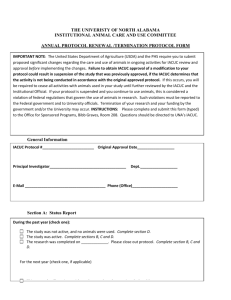
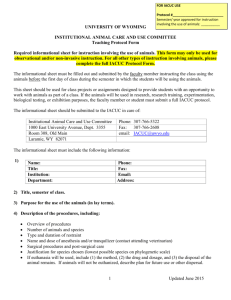
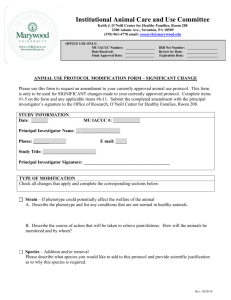
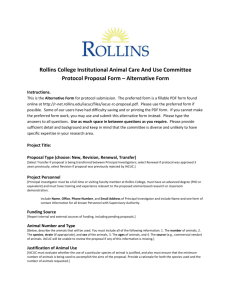
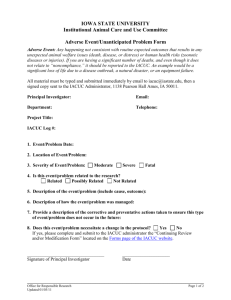
![Annual Renewal Form [Word doc]](http://s3.studylib.net/store/data/006747085_1-a9e44ad7ea0dbb852a0e727dcb34abcc-300x300.png)
